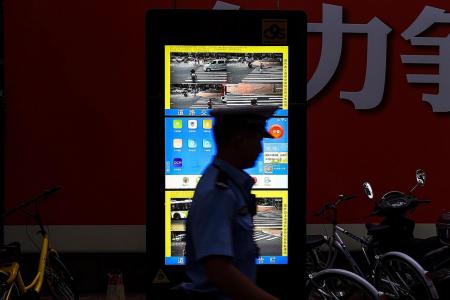'Big Brother' goes hi-tech in China
The country is leveraging on technology for mass surveillance without much concern for civil liberties
As tens of thousands of Chinese drinkers attended a beer festival in the eastern port city of Qingdao in August, a software program scanned their pictures.
Those on a police list of wanted persons were pinpointed in less than a second. By the end of the three-week event, the authorities had made 25 arrests, including one of someone on the run for a decade.
According to police, the program correctly matched faces in 98 per cent of cases.
This is one of the latest examples of how Beijing is tapping on technology to redefine the limits and scale of mass surveillance.
In the last year, Beijing opened a military base in Djibouti in Africa, deployed warships in the Baltic and Atlantic and asserted itself in the disputed South China Sea.
But these priorities pale in comparison to the leadership's commitment to retaining control at home.
China's government has long used all possible resources to keep track of its people and stifle dissent. Spies and wiretaps of the early communist era have been followed by high-tech surveillance of China's internet and social media.
China is one of the earliest large-scale adopters of facial recognition technology, tapping into millions of security cameras across the country.
Such techniques allow those wanted by the state to be quickly - and often automatically - identified, sometimes en masse.
Separately, Chinese media have reported that researchers have developed programs that can identify individuals from several hundred yards away simply by their walking style.
For Chinese citizens, mass surveillance is now a largely unquestioned part of everyday life.
CCTV feeds from private security cameras are often broadcast live online, watched by the curious or prurient, and the activities of passers-by are discussed on Internet forums with little regard for privacy.
In 2011, American academic Rebecca MacKinnon coined the phrase "networked authoritarianism" to describe the way China has aggressively monitored and censored its own social media platforms while blocking access to many foreign services such as Facebook.
Chinese authorities are now able to censor social media faster and in greater volume, becoming more effective at blocking searches for controversial topics such as Tibet or the 1989 Tiananmen Square massacre.
When the authorities find something increasingly difficult to monitor and control, such as online video or audio streaming, they try to ban it outright.
In 2014, Chinese authorities unveiled a strategy to tie together the data available on each individual and private institution to allocate a "social credit score," essentially a way of determining who might be a disruptive influence to society.
AMBITION
While it won't be in effect until 2020, it remains the overarching ambition of Beijing's security apparatus and will become much easier as technology leaps ahead.
In Western democracies, the deployment of such techniques has been slowed by concerns over civil liberties.
Those qualms are largely absent amongst China's leadership.
In fact, facial recognition and similar technologies are increasingly used by major businesses in China, with few of the regulatory restrictions that have slowed their adoption elsewhere.
Increased computing power looks set to ramp up their capabilities still further - particularly given China's emergence as a frontrunner in the development of artificial intelligence and associated fields.
Whether that will be enough to stymie dissent is another question.
Beijing has faced a string of massive pro-democracy protests in Hong Kong since 2014, culminating in tens of thousands taking to the streets in August after the jailing of several prominent pro-democracy activists.
China's high profile anti-corruption drive - which the Communist Party says led to up to a million arrests last year - has in part been aimed at alleviating popular anger over graft.
But critics say it has also been used to purge political opponents and rivals, bringing in a new generation perceived as more loyal to the senior leadership.
The writer is Reuters' global affairs columnist, writing on international affairs, globalisation, conflict and other issues
Get The New Paper on your phone with the free TNP app. Download from the Apple App Store or Google Play Store now



